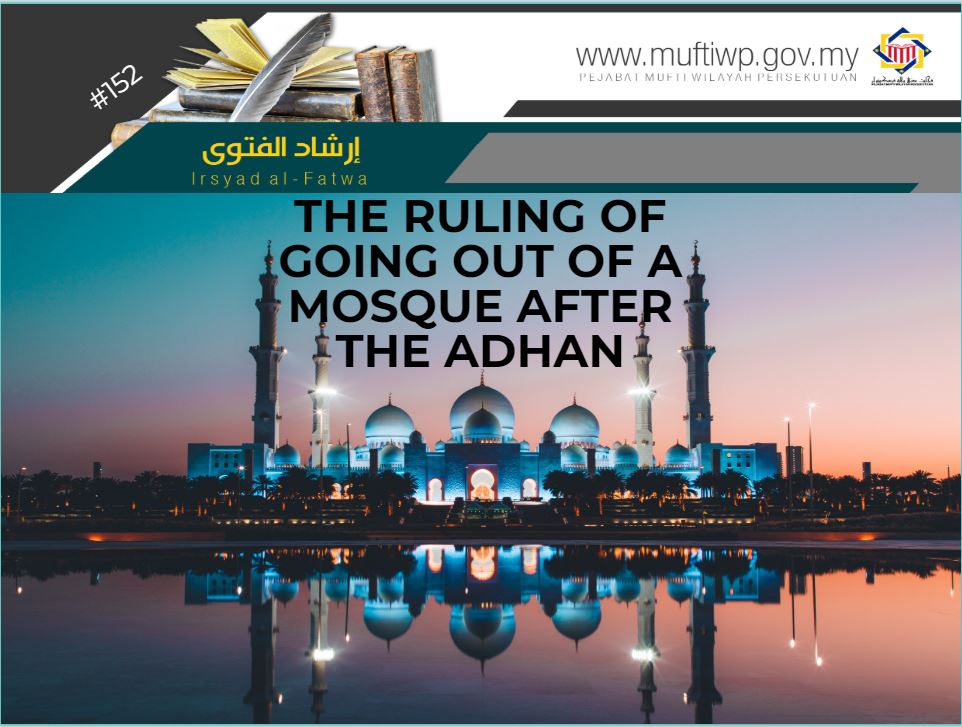Question:
What is the ruling for a person who went out of a mosque during or after adhan?
Answer:
Alhamdulillah, praise and thanks to Allah for the many countless blessings He has blessed us all with. Blessings and salutations to the Prophet Muhammad PBUH, his wives, his family, companions and all those that follow his teachings to the day of judgement.
There is a sound hadith that clearly prohibits the act of leaving a mosque while the adhan is called. Abu al-Sya’tha’ narrated:
كُنَّا قُعُودًا فِي الْمَسْجِدِ مَعَ أَبِي هُرَيْرَةَ فَأَذَّنَ الْمُؤَذِّنُ فَقَامَ رَجُلٌ مِنَ الْمَسْجِدِ يَمْشِي فَأَتْبَعَهُ أَبُو هُرَيْرَةَ بَصَرَهُ حَتَّى خَرَجَ مِنَ الْمَسْجِدِ فَقَالَ أَبُو هُرَيْرَةَ أَمَّا هَذَا فَقَدْ عَصَى أَبَا الْقَاسِمِ صلى الله عليه وسلم.
"We were sitting in the mosque with Abu Hurairah when the mu’azzin called the Adhan. A man got up and walked out of the mosque, and Abu Hurairah followed him with his gaze until he left the mosque. Then Abu Hurairah said: "This man has disobeyed Abul-Qasim (the Prophet PBUH).'"
Sahih Muslim (655)
In another hadith from Abu Hurairah RA, he said:
أَمَرَنَا رَسُولُ اللَّهِ صَلَّى اللَّهُ عَلَيْهِ وَسَلَّمَ إذَا كُنْتُمْ فِي الْمَسْجِدِ فَنُودِيَ بِالصَّلَاةِ فَلَا يَخْرُجْ أَحَدُكُمْ حَتَّى يُصَلِّيَ
“The Prophet PBUH commanded us to stay in the mosque while the adhan is called, and don’t go out until you have prayed.”
Musnad al-Imam al-Ahmad (10933)
Scholars have differing opinion regarding the ruling of leaving the mosque after the adhan without any reasons. Some ruled it prohibited while others ruled it makruh.
In the fiqh of mazhab Hanbali, Ibn Qudamah Rahimahullah states in al-Mughni, it is impermissible to leave a mosque after the adhan unless if there is a reason or necessity. He then cited al-Imam al-Tirmizi Rahimahullah, who states that scholars and companions of the Prophet PBUH never left a mosque after the adhan except if there is a reason or necessity. [1] The same is stated in al-Iqna’ where it is prohibited to leave a mosque after the adhan without a reason, necessity or intention to return to perform the prayer. [2]
Al-Imam al-Syaukani Rahimahullah said, the two hadiths stated above (hadith from Abu al-Sya’tha’ and Abu Hurairah) are evidences in the prohibition of leaving a mosque after the adhan is called except for those who wants to perform the ablution, qadha’ hajat, or for a necessity until the prayer is performed. [3]
In fiqh books of mazhab Maliki, if someone leaves after the iqamah to purify himself for prayer, but does not return, then his action is prohibited. Whereas, if he leaves after the adhan, then it is makruh unless he has the intention to return to the mosque. However, if he leaves because he does not want to perform the prayer, then he is considered as a munafiq (hypocrite) and disaster may fall on him as a punishment from Allah SWT. [4]
When commenting on the above hadith by Abu Sya’tha’, Imam al-Nawawi Rahimahullah ruled it makruh for anyone who leaves the mosque after the adhan until he performs his obligatory prayer unless he has a reason (permitted by syarak). [5] The same is stated in al-Majmu’ by al-Imam al-Nawawi. [6]
The reasons that permit someone to leave a mosque after the adhan are if someone has to take his ablution, but the place is far, or if he leaves with the intention of returning to the mosque after waking up his family members, or his intention of leaving the mosque is to go to another mosque where the imam has better knowledge and recitation. Other reasons include if there is a necessity for him to leave, such as sickness that needs immediate medical treatment and others.
Conclusion
According to the above discussion, we are inclined towards the opinion that ruled it makruh (undesirable) to leave a mosque after the adhan without any reasons, in accordance with Syafi’eyyah scholars’ opinions written by Syeikh Dr Wahbah al-Zuhaili Rahimahullah in his book al-Fiqh al-Islami wa Adillatuh. [7]
Although the ruling is makruh, it is best to stay in the mosque if the adhan has been called and perform the congregational prayer together to avoid the khilaf in this issue, unless if there is a reason for leaving. Wallahua’lam.
End notes:
[1] See al-Mughni. Maktabah al-Qaherah, (1/296).
[2] See al-Iqna’ fi Fiqh al-Imam Ahmad bin Hanbal. Dar al-Ma’rifah, (1/80).
[3] See Nayl al-Awtar. Dar al-Hadith, (2/192).
[4] See al-Fawakih al-Dawani ‘ala Risalah Ibn Abi Zaid al-Qairawani. Dar al-Fikr, (1/172).
[5] See al-Minhaj Syarh Sahih Muslim. Dar Ihya’ al-Turath al-‘Arabi, (5/157).
[6] See al-Majmu’. Dar al-Fikr, (2/179).
[7] See al-Fiqh al-Islami wa Adillatuh, Dar al-Fikr, (1/711)


